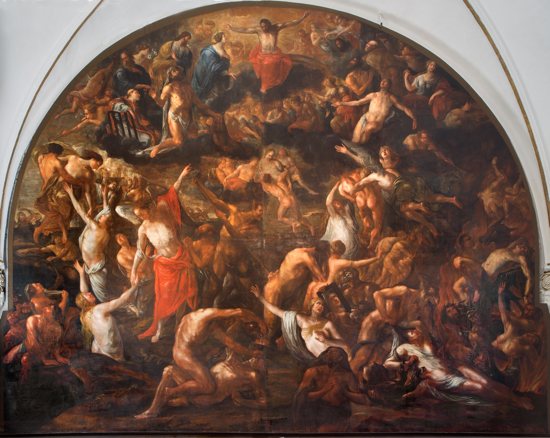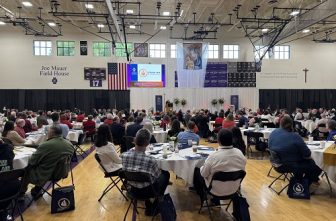
The possibility of hell is a troublesome truth. Not only does it run counter to what I believe to be the basic assumption of many believers these days: that is, that in the end all are saved except for the most hardened and obvious of cases. It also seems to run counter to what we do in fact know about God, and what we rightly emphasize in our efforts at evangelization — he is all good, all loving and all merciful. Does this not preclude the prospect of his condemning men and women to eternal death?
Nope.
We read in Sunday’s powerful Gospel that Christ will at the end of time draw all men before him and deliver the sentence that they have written for themselves by their love or lack thereof — and this sentence may very well include eternal damnation. If we have chosen to respond to the revelation of Jesus Christ with living faith, that is, active love for friend and foe alike, and especially in active service of those most in need, our destiny shall be heaven, and an eternal participation in the glory of Christ himself. But if we have refused to respond generously to this pearl of great price and have closed our hearts to the needs of others, there awaits an eternal fire prepared for the devil and his legion. There is no third option listed.
Hell, like heaven, begins on earth, within the soul of every man and woman.
If heaven is union with God, we can rightly say that even should a believer endure brutal agonies this side of the veil, if the believer remains in a state of grace doing what the Father wills, the believer has the kingdom of God in his or her heart. This beatitude will come to full flourishing in the presence of the one to whom we looked to save us, but it begins now, in this valley of tears.
So, too, it is with hell. The essence of hell is the isolation of self-love, a willful refusal to dislodge from self-interest in our own minds and hearts. The damned reject the call to leave all and to follow Christ. They reject the call to leave their pride, their self-sufficiency, their security and their self-preservation. Instead, they choose to cling to what they believe to be their own by right — their will, their way and themselves. They refuse to embrace the mystery of gift, and instead cling viselike to what they fear to lose.
The Church’s teaching on the real possibility of being separated from God forever comes directly from the mouth of the Messiah himself. Mortal sin, that is, a deliberate act that separates the soul from the grace of God, is the traditional term for the decision to walk away from the Father. For one to commit a mortal sin, one must know that the act performed is gravely sinful and one must freely do it. No one can accidentally commit a mortal sin, or in a strict sense, be forced into it. The act itself must also be objectively serious, what tradition calls a “grave matter.”
Many contemporary discussions about mortal sin include sins of impurity or grave assaults against the innocent. And rightly so. But I think in light of the Gospel given for the solemnity of Christ the King this year, we must also accept that sins of omission can also be quite grave, particularly when what is being omitted are the rights of others and the needs of the poor.
Indeed, it is significant that Christ does not criticize the condemned for their lack of religious fervor, or sins of the flesh, or blasphemy. He condemns them because they were wholly negligent of the poor. Nowhere does Christ indicate that they were particularly cruel to their fellow man. It is possible that the damned simply did not see the poor, because in the hardness of their hearts they had grown blind, accustomed only to viewing their own lives, comfort, anxieties and hopes. They are like the rich man in the parable of Lazarus at the door: So eager to partake of the lavish dinner awaiting him each night, the rich man steps over the one at his own door, not acknowledging his need or presence.
Our lives are precious, and the decisions we make or don’t make matter. It is not enough to say “Lord, Lord,” and to proclaim the kingship of Christ only with our lips. We must also acknowledge him as our King in every facet of our existence. That is, we must be like him, living for love of the Father and our neighbor, even unto death, the death of self. Dying to self and a calculated dethroning must be waged every day upon the idols we build for ourselves within our hearts in obvious and subtle ways. Without this, we will get what we ask for — an eternity of gazing upon ourselves, turned away from God and our fellow man. Alone. Forever.
It does not need to be so. We are reminded this weekend that the King shall return and he shall judge the living and the dead. Awakened by this warning, may we be found waiting when he comes, busy about the concrete, sacrificial acts of love and service that are the fruits of the kingdom of God within our hearts, most notably service to the poor.
Father Erickson is pastor of Transfiguration in Oakdale.
Sunday, Nov. 26
Solemnity of our Lord Jesus, King of the Universe




